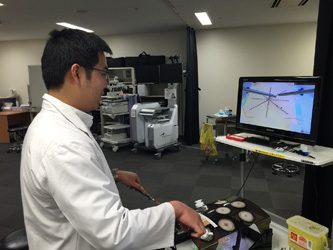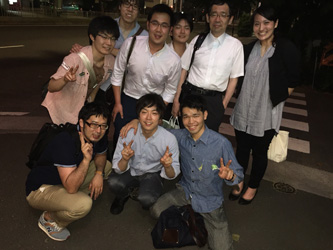Clinical Exchange in Japan
Welcome to Japan and Nagoya University school of Medicine!
Experience Report
Nicholas Chia from University of Adelaide, Australia
Period:2015/5/25 – 6/20
Department: Gastroenterological Surgery
I was recommended to undertake a clinical elective at Nagoya University Hospital from a fellow student at my university. Also, having enjoyed visiting Japan before for leisure, I looked forward enthusiastically with high expectations. I was not disappointed. During my time at Nagoya University Hospital, I expanded my knowledge in the field of my interest, enjoyed myself, and also got to experience a taste of Japanese culture and hospitality.
I travelled to Nagoya with a fellow student from my university, Frederick, who was going to undertake an elective in a different department. Settling in Nagoya on the day of my arrival was easy with the help of the university and student accommodation staff. The next morning, we took a train to the hospital, where Dr Hasegawa, who was already awaiting our arrival at the gate, received us. I was quickly introduced to the staff of the department and shown around the hospital. This included being brought to lunch at the hospital staff cafeteria, where I was amazed at the variety and quality of the food, which were all at very affordable prices. I remember wishing at least more than ten times during my entire stay that we had this sort of cafeteria back in Adelaide.
Two days later, I attended the weekly unit meeting where my supervisor, Professor Kodera, formally introduced me to everyone in the department. It was also on that day that I saw my first total gastrectomy, where I was very impressed with the planning and procedural skills of the surgeons as they completed the procedure with speed and precision. Furthermore, the surgeons also took time to teach and explain aspects regarding the case to me and the other Japanese students. Considering my very basic Japanese proficiency, the surgeons also made considerable effort to explain and converse with me in English during my entire attachment, which is something I was extremely grateful for.
From an educational perspective, I spent most of my time learning in theatre where I saw various procedures such as laparoscopic gastrectomy, laparoscopic hernia repair, oesophagectomy, just to name a few. Some of these procedures, especially for advanced diseases, were very complicated, and practically took up the entire day, sometimes only ending in the evening. I was amazed at the calm and patient demeanor displayed by the surgeons, who showed no signs of fatigue and were always ever ready to teach the students. I also attended a suturing tutorial led by one of the senior doctors for the Nagoya University 5th year students. Despite the language barrier, I had no problems participating in the tutorial as the department had conveniently attached a doctor to me just to translate everything and ensure I was well looked after.
During my 4 weeks elective, I also attended a laparoscopic simulation session every Thursday, alongside the 6th year students, of which most, like me, had a keen interest in surgery. The session involved using a machine which simulated different laparoscopic tasks, ranging from cutting a simple cloth, to performing a cholecystectomy, with the aim of improving hand-eye coordination. There was also another machine, which involved using real sutures to suture under the laparoscope. This task proved rather difficult at first, and I was really impressed at how good the Japanese students were. The real challenge for me at the end of the 4 weeks was to place sutures laparoscopically to close an open wound, in which the machine had its ways to detect our precision and technique. I am happy to say that I passed, with the help of my tutors and peers.

In Nagoya, it was not all work and no play. It was my privilege to have dinner with Professor Kodera and a batch of 6th year students finishing their rotation, which was a custom in this department. We walked to a small restaurant near the hospital, which was run by a Japanese couple. The restaurant served Yakiniku, which was essentially meat that we barbecued ourselves on a grill in front of us. It was interesting to converse with everyone in a casual environment over delicious food and a few glasses of Japanese beer, of which I enjoyed myself and learnt more about the Japanese way of life.

During my free time in Nagoya, I explored areas in the city, which included the shopping district Sakae and Nagoya station. I also visited places of interest, which included the Nagoya Science Museum, Toyota Museum and Shinkansen Museum. I was fortunate that my travelling buddy Frederick and I both shared a common liking in Japanese food, as the food in Nagoya was absolutely wonderful. I also indulged myself in several ‘Nagoya exclusive’ delicacies, with my personal favourites being ‘Tebasaki’ (fried chicken wings), Hitsumabushi (grilled eel on rice in a stone pot) and Misokatsu (fried pork with miso sauce on rice). On one of the weekends, I also travelled with Frederick to the scenic Shirakawa-go, a traditional Japanese village up in the mountains in the Gifu Prefecture, which is also recognised as a UNESCO world heritage site. On the recommendation of some of the doctors, we also went to Gero Onsen, a hot spring town in the Gifu Prefecture, where we got to experience first hand the famed hot springs of Japan.
Unfortunately, all good things must come to an end. Towards the end of my elective, I had a farewell dinner with Professor Kodera, who brought me to a small restaurant that I would never find on my own. The restaurant served exclusively chicken, and this was the first time in my life that I ate chicken sashimi (raw chicken with soy sauce and wasabi). Despite my fears of Salmonella, I trusted in the Japanese preparation technique and attention to fine details. My gamble paid off as I enjoyed a sumptuous meal, accompanied by Japanese Sake, and I can safely say that there were no problems with my bowels after.
To sum things up, I had a really enjoyable and memorable time in Nagoya. I expanded my medical knowledge during this elective and the hospitality displayed towards me was truly incredible. I would definitely recommend Nagoya as an elective destination for medical students.
Click here to read other stories
Nagoya University Graduate School of Medicine